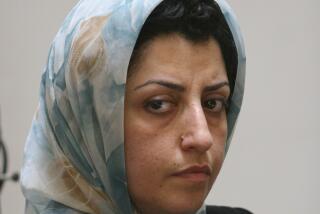Iran frees U.S. scholar on bail
TEHRAN — Authorities in Iran on Tuesday released an American scholar jailed on national security and espionage charges, though she continues to face grave charges and is barred from leaving the country.
Haleh Esfandiari, 67, who holds both U.S. and Iranian citizenship, was released on bail set at the equivalent of $333,000. Shirin Ebadi, a Nobel Peace Prize winner and Esfandiari’s attorney, said the scholar had put up her ailing mother’s home as bond.
Esfandiari’s husband, George Mason University professor Shaul Bakhash, said he spoke to his wife late Tuesday morning for the first time since she was locked up in Evin prison in May.
“She sounded hopeful that this was just the first step and that she would travel and join her family soon,” he said in a phone conversation. “She sounded obviously elated to be out of Evin. She sounded quite well, I thought.”
But Esfandiari continues to face charges and may have to appear in court or be returned to prison. Judge Hassan Haddad, a prosecutor in a special national security court, told the Mehr news agency that the inquiry of Esfandiari and another detained Iranian American scholar continued. He said indictments could follow the investigations.
Iranian officials typically forbid those on bail while facing political charges to leave the country. In the rare cases when they are allowed to leave, they usually must post their homes as bond.
“The release of Haleh does not necessarily imply that she can leave the country in the near future,” said Mohammed Hossein Aghassi, the lawyer of Parnaz Azima, an Iranian American journalist barred from leaving Iran because she faces charges of spreading propaganda against the regime.
Esfandiari heads the Middle East program at the Woodrow Wilson International Center for Scholars, a Washington think tank. She was stopped and robbed of her travel documents by masked men as she was leaving Iran after what was meant to be a brief trip to her native country over the Christmas holidays.
When she sought new documents, she was barred from leaving the country and subjected to weeks of interrogation. On May 8 she was locked up inside Evin, Iran’s most infamous prison, without access to a lawyer.
Three days later, authorities locked up Kian Tajbakhsh, an Iranian American sociologist working for philanthropist George Soros’ Open Society Institute. Both were charged with undermining Iran’s national security.
Esfandiari and Tajbakhsh appeared on Iranian television last month in a two-part documentary called “In the Name of Democracy,” which showed them allegedly confessing to taking part in a U.S.-backed plot to spark a peaceful revolution against Iran’s leaders.
Human rights advocates say hundreds, perhaps thousands, of imprisoned Iranian dissidents are subjected to psychological and physical abuse.
Some analysts said the tremendous international spotlight on the plight of Esfandiari might have helped gain her release.
Lee H. Hamilton, the former Indiana congressman who heads the Wilson center, recently sent a letter to Iran’s supreme leader, Ayatollah Ali Khamenei, asking for Esfandiari’s release.
To the surprise of all, Khamenei replied to Hamilton. Iran’s top spiritual and political leader wrote that he had given instructions that the case be addressed soon.
Others weren’t so sure the pressure was responsible for her release.
“I think [Esfandiari’s] age and worry for her health were taken into consideration by the judiciary branch,” Aghassi said.
--
Special correspondent Mostaghim reported from Tehran and Times staff writer Daragahi from Irbil, Iraq.
More to Read
Sign up for Essential California
The most important California stories and recommendations in your inbox every morning.
You may occasionally receive promotional content from the Los Angeles Times.










